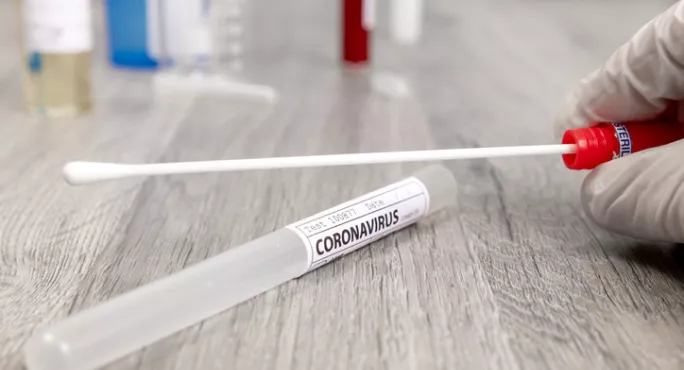
Covid testing in colleges: How will it work?

Earlier this week, the Department for Education announced that from January all colleges would receive rapid Covid-19 tests. Staff are due to be tested weekly, and students will be tested if they come in contact with someone who has themselves tested positive.
Where will the coronavirus tests come from?
All the testing kits, materials and training materials will be provided at no cost, and NHS Test and Trace will provide reimbursement of reasonable workforce support costs.
Do staff have to administer the tests?
The DfE says that swabbing and processing of these tests will be conducted at a dedicated testing site in colleges, either by trained personnel or as a self-test with supervision from trained personnel, with results in around 30 minutes.
There are seven roles that need to be fulfilled by staff - but more than one role can be taken on by one person. Colleges can use existing staff, college nurses, volunteers or temporary staff to undertake these roles.
- Quality lead/ team leader
Responsible for the overall on-site operations at the test site, including day-to-day workforce management. Ensures quality assurance, and incidents and risks mitigation across the testing service. - Test assistant
Provides guidance and supervision to subjects on swabbing as requested. Collects completed swabs and passes them to the processing operatives. Ensures cleaning of swabbing bays. - Processor
Prepares the test sample for analysis, conducts processing of lateral flow tests and interprets the result. Provides the results to the results recorder and ensures cleaning of processing bays. - Covid-19 coordinator
Performs sign-off and schedules testing activities, ensuring communications and consents are actioned and management of positive cases as per college guidelines. - Registration assistant
Responsible for ensuring that subjects have registered and distributing test kits on arrival, and ensuring orderly entry of subjects on to the testing site. - Results recorder
Collates results from processing operatives and uploads to digital software. - Cleaner
Cleans the testing bays, and ensures that waste is correctly disposed of, including working with a clinical waste remover to dispose of clinical waste.
Exams 2021: Lack of support for January exams ‘unforgivable’
Coronavirus: Colleges to have weekly Covid testing from January
Need to know: The Covid workforce fund explained
How will training work?
The DfE says that there will be daily introductory webinars that staff can sign up for, and that from the start of next term, more training sessions will be available for staff.
There will be a four-step training process to go through:
- A 10- to 15-minute video on the testing process.
- An online information sheet that reviews roles and responsibilities.
- Online training modules for each role that could be anything from 30 minutes to two hours.
- A complete on-site run-through of the swabbing and processing procedure to happen on the first day of testing.
What does the testing site need to look like?
Colleges will need to set up a testing site. The requirements for this site are:
- The test site flooring must be non-porous.
- The test site must be well lit and have good airflow.
- There must be a registration desk at the first point where the test subject would enter the test site.
- One-way direction of travel for test subjects. If not possible, enough room should be provided for test subjects to exit the room whilst maintaining social distance.
- The test subject chair in the swabbing bay should be a minimum of 2m away.
- Each swabbing desk must have a processing desk close by - no more than 1m away. The recording desk to be located close by.
- Test subjects must not enter the processing area. This should be demarcated.
- There must be a clear division between the swabbing and processing area. This should be demarcated.
How many tests are expected per day?
The number of tests administered per day will depend on how much space there is, how many people are supporting the process and how many tests are needed.
If, for example, there are 100 people being tested, there could be three bays, testing could take three hours and nine people would be needed to oversee the process.
However, if there are 30 people being tested, there could be three bays, testing could take one hour and five people would be needed to oversee the process.
Do colleges need to get consent?
Currently, participation is voluntary and consent must be required by staff, students or parents/legal guardians.
What happens if staff or students test positive?
If there is a positive result, that person must then take a confirmatory PCR test and self-isolate while they wait for the result. If the result is positive, they must self isolate for 10 days.
You need a Tes subscription to read this article
Subscribe now to read this article and get other subscriber-only content:
- Unlimited access to all Tes magazine content
- Exclusive subscriber-only stories
- Award-winning email newsletters
- Unlimited access to all Tes magazine content
- Exclusive subscriber-only stories
- Award-winning email newsletters
You need a subscription to read this article
Subscribe now to read this article and get other subscriber-only content, including:
- Unlimited access to all Tes magazine content
- Exclusive subscriber-only stories
- Award-winning email newsletters
- Unlimited access to all Tes magazine content
- Exclusive subscriber-only stories
- Award-winning email newsletters